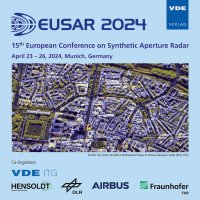On the estimation of InSAR phase and coherence through self-supervised learning
Konferenz: EUSAR 2024 - 15th European Conference on Synthetic Aperture Radar
23.04.2024-26.04.2024 in Munich, Germany
Tagungsband: EUSAR 2024
Seiten: 4Sprache: EnglischTyp: PDF
Autoren:
Sica, Francescopaolo; Schmitt, Michael
Inhalt:
In this paper, we focus on the estimation of interferometric synthetic aperture radar (InSAR) parameters, a preliminary step that is inherent to the entire InSAR processing pipeline and serves as a prerequisite for the generation of derived information such as digital elevation models and ground displacement assessments. Deep learning, in particular convolutional neural networks (CNNs), has enabled a paradigm shift in the field of image denoising and has recently received considerable attention. However, conventional supervised approaches require annotated images for training, a requirement that often remains unfulfilled or is subject to inaccuracies, especially in the context of remote sensing applications. To overcome this limitation, novel semi-supervised and self-supervised denoising strategies have emerged. These methods can extract knowledge from exclusively noisy data instances, which can be obtained from pairs of noisy images or from noisy elements in the same image. In this research, we build on recent self-supervised learning techniques, with a particular focus on incorporating principles derived from the Noise2Void and Noise2Self methodologies. These strategies have already demonstrated remarkable effectiveness in a variety of image denoising tasks. We undertake an extension of these techniques to specifically address the unique challenges inherent in InSAR phase and coherence estimation. These challenges arise from the complex-valued nature of SAR interferograms, which leads to unique processing considerations that require innovative methodologies.


